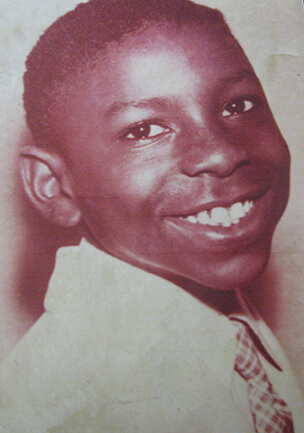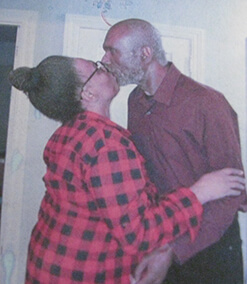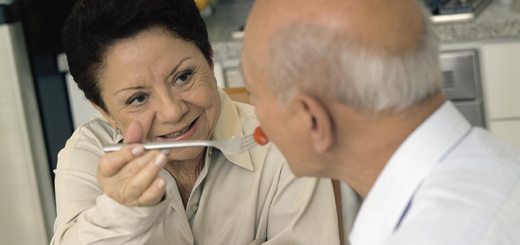From caregiver to educator: Empowering the Black community
When Gleoria’s husband Curtis was first diagnosed with dementia, she turned to the Alzheimer’s Association® for help. Through the Association she found support and resources she would have otherwise not known about. Because of this she was able to give Curtis the best care she was able to. Five years after her husband’s death, Gleoria continues to support her friends and family by sharing resources with her community.
A good mechanic
Curtis was born in San Francisco during the late 1940s as the third child out of four. He was a creative man who was good with his hands, could fix just about anything and was great at conceptualizing. As a young adult, he served in the Vietnam War, based out of Germany. When he returned, he found a job as a general mechanic for United Airlines.
After meeting his wife, Gleoria, the couple moved to Oakland and raised their family there. When he retired from United Airlines, he worked part time at FedEx and rode his bike to work. He worked there until he noticed he was too unstable to safely ride his bike. Curtis was later diagnosed with Parkinson’s disease.
“He was always a helpful person going of his way to lend assistance to others,” said Gleoria. “He watched TV and could tell you about current events and his opinion about current events. He watched sports, he liked cars and could always work and repair anything. He liked to shop, he was a dapper man, if he saw something [he liked] he’d buy for house or himself. Most of things in the house he bought.”
Discovering the gene
When Curtis received his Parkinson’s diagnosis, he thought to himself, “Why me?” Gleoria, who had an interest in ancestry, had previously taken a DNA test several years before and thought sharing that with Curtis may help him. She purchased a test for Curtis and other family members. They requested health tests in addition to finding African origins. With these results they discovered that Curtis had one of the genes for dementia.
It is believed that there are more than 100 genes for developing Alzheimer’s. While having one of the risk genes increases the likelihood of developing the disease, it does not guarantee it will happen.
When Curtis began to have trouble remembering things or buying multiple tape measures and bottles of ketchup, it was clear they needed to seek help. Curtis was given a basic memory test and was diagnosed with mild cognitive impairment (MCI).
African American Alzheimer’s forum
According to the Alzheimer’s Association 2024 Facts and Figures report, African Americans are twice as likely as Whites to have dementia. Among Black Americans ages 70 and older, 21.3% are living with Alzheimer’s, and 65% of Black Americans say that they know somebody with Alzheimer’s or dementia. Despite this, only 35% of Black Americans say they are concerned about Alzheimer’s or dementia.
After her husband’s diagnosis, Gleoria began attending the African American forum, an education program hosted by the Alzheimer’s Association. There, members of the Black community can come together to find local resources, hear from professional and connect with other caregivers.
It was through the forum that Gleoria learned that Curtis could receive testing through Veterans Affairs (VA). “When I went to the forum, they had all these tables, there was someone from the VA, at a table. I met a social worker or a psychologist, who told me my husband could go to the VA for testing. Because he was a veteran, he could be tested free of charge*.”
A new diagnosis
Once at the VA Curtis went through a series of testing where he was officially diagnosed with dementia with dementia with Lewy bodies (DLB). “From there we started trying to live with it,” said Gleoria. “He was falling, and things would happen in the house.
As the disease progressed, Curtis had hallucinations and became paranoid that Gleoria was taking his money. After a trip to the emergency room in December of 2019, it was clear that Curtis was nearing the end of his life. His doctors suggested he be put on palliative care and sent him home. The family enjoyed one final Christmas together before Curtis’ death in February 2020.
Continuing to educate
Since the death of her husband, Gleoria has continued to share information about the disease with her friends and members of her church. “Knowing it affects African Americans and women more than other groups,” said Gleoria. “It makes me feel that’s something we should be concerned about and know more about.
Gleoria has noticed that many people don’t know the difference between normal aging and what could be the signs of dementia. “I shared it with a young man at church the other day,” said Gleoria. “[I said,] ‘Let’s read this and see if you can tell [if it’s normal aging or not]. Individuals [need to be] aware for themselves as well as their family members. Without knowledge they might not take action as quickly as they could.”
Five years after her husband’s death, Gleoria is continuing to help her community. She is currently working with the Alzheimer’s Association to become a community educator. As a volunteer she will help educate her community about Alzheimer’s and other dementia by delivering prepared presentations and answering questions.
Contacting the Association
Gleoria reflects on the time with her husband and recalls how helpful the Association was during this time. She encourages other caregivers to connect with the Association and use their resources. “I had to call the Alzheimer’s Association [when I] didn’t know what to do because [my husband] didn’t want to take his meds,” said Gleoria. “They have a wealth of information from dealing with day-to-day activities and knowing the resources that are available.
“The bible has a verse in Psalm 139, ‘We are fearfully and wonderfully made.’ What keeps me coming back [to the Association] is our bodies are so amazing, when something goes awry and it causes you to change and if it’s your brain, it is going to affect your whole entire life. I think people need to know [about the disease]. I see signs of aging in my own memory and forgetfulness and I see it in my friends and you’re able to be appreciative of what you have.
“From getting information for the VA from the forum and having their 24/7 Helpline as well as support. The organization has so many activities to make people aware [of the disease]. I found the Association very helpful and share it with others.”
The Alzheimer’s Association 24/7 Helpline (800.272.3900) is staffed 365 days a year. This free service offers support for people living with dementia, caregivers, families and the public. Connect with a live person who can provide information, local resources, crisis assistance and emotional support.
To learn more about Alzheimer’s in the African American community, visit alz.org/africanamerican.
The African American forum is typically hosted during the fall and is not scheduled at this time. For a list of upcoming education opportunities please visit alz.org/events.
*If you are a veteran, please look into your specific benefits to see what you qualify for. Not all veterans qualify for free screenings. Learn more at va.gov/health-care




















